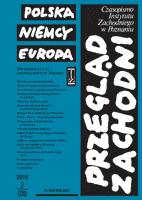Ruchy obywatelskie w Niemczech Wschodnich w 1989 roku
Civil Movements in East Germany in 1989
Author(s): Ireneusz SmolarkiewiczSubject(s): Politics / Political Sciences
Published by: Instytut Zachodni im. Zygmunta Wojciechowskiego
Summary/Abstract: In the 1989 breakthrough in East Germany, the GDR opposition emerged distinctly on the public scene (the first opposition movement, Initiative für Menschenrechte, was created already in 1985). The author focuses entirely on 1989 as the last year of the GDR’s existence. The activity of civil groups had been gaining momentum since the beginning of the 1980s, their members eventually becoming more confident in their pursuits. The major civil movements were: IFM, Neues Forum, Demokratie Jetzt. The appearance of new civil movements and parties in the GDR that could be labeled opposition was accompanied by a growing wave of migration to the FRG. Following the reunification of Germany, which meant the dissolution of the GDR, civil movements lost their raison d’être, as they had been created with the aim of reforming the East German state. In the new circumstances there was no room for opposition against the ongoing transformations, although for the citizens of the GDR they proceeded too violently. The top-down process of transformation eliminated those thinking differently. It is a characteristic feature of the transformations in Germany that individuals who represent a different stance from the prevailing majority, are eliminated from the discourse.
Journal: Przegląd Zachodni
- Issue Year: 333/2010
- Issue No: 02
- Page Range: 188-203
- Page Count: 16
- Language: Polish

